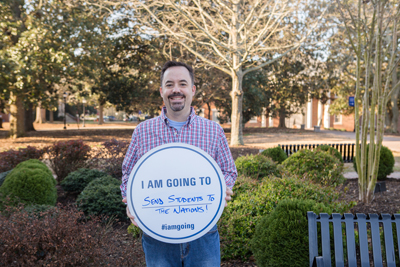Faculty Q&A with Greg Mathias
January 19, 2017

Greg Mathias is an assistant professor of global studies and the associate director of international missions for the Center for Great Commission Studies at Southeastern. He shares about his call to missions and how he encourages students to live Great Commission lives.
 1. Tell us about yourself.
1. Tell us about yourself.
I grew up as a “Navy brat.” So we spent many of my younger years in places like Guam, Hawaii, and eventually ended up in Virginia Beach. I was always involved in church growing up, even though we were traveling a bunch. Eventually I went to Virginia Tech for college, and Southeastern Seminary for my master’s and doctoral work. I’m married to Page, and we have four daughters.
2. How did you come to SEBTS?
I went into the workforce for a few years after college. My wife and I were involved with campus ministry (Cru) while we were in college, and we later served as campus staff with Cru at Penn State after we were married. Later, we were called to the mission field, and we found out about Southeastern’s 2+2 program. We enrolled at Southeastern, did our coursework on campus, and then moved to the Arabian Peninsula for about four years from 2003-2007. Eventually we came back so I could do Ph.D. work, and now I equip missionaries and other students here at Southeastern.
3. When people ask you, “What do you do at Southeastern,” what is your response?
My official titles are Associate Director of International Missions and Assistant Professor of Global Studies. I see my work as an extension of what the Lord called my family to do. The Lord has called me to missions, and I think my work at Southeastern is part of that, even though I’m no longer in the Middle East.
4. On what are you currently working?
Right now I am finishing up recording a free online class for Southeastern on the practice of missions. I’m also working on a chapter in an Evangelical Missiological Society book on recovering the role of ethics within missionary practice. Finally, I am in the beginning stages of working on a book dealing with missionary biography and the fruit of the Spirit.
5. What have you been reading recently?
I just finished “One Gospel for All Nations” by Jackson Wu, which is a practical approach to biblical contextualization. I’m also re-reading the classic “Abiding in Christ” by Andrew Murray and “1776” by David McCullough.
6. When you get home from work, what do you look forward to doing? (What are your other passions?)
I enjoy spending time with my family. We love doing all sorts of stuff outdoors. So we like to go for walks, hikes, and have even gotten my wife and daughters to do some camping.
7. Who are your role models?
My grandmother, Elizabeth Medlen, is largely responsible for my love for missions. Also, my pastor while at Penn State, Andy Renfrew, has inspired me through his work as a bi-vocational pastor and engineer. I’m also encouraged regularly by my colleagues at Southeastern and others whom I serve alongside of at my local church, North Wake.
8. What has God been teaching you lately?
The Lord has been using “Abide in Christ” by Andrew Murray to remind me to abide in Christ not with Christ. He’s also teaching me about overcoming my cynical bent by helping me to understand what it means to have “friendship” with God.
9. When a student completes your class, what do you want him or her to walk away with at the end of the semester?
I want students to connect living out the Great Commission within the context of the Great Commandment. I want their love for God to grow and for that to affect how they love and influence the people around them. I want there to be a personalization of the nations so that when they run into someone who isn’t an American, they see them as a real person, with a real life, with real hopes and dreams, not just as a person unlike themselves.
10. We always say that every classroom at SEBTS is a Great Commission classroom. What does that look like for your class?
One of the questions I love to ask after students finish my class is this: “How do you pray differently?” Once you love God and love people, and you begin to understand the nations, your prayer changes. You pray for real people, not just “the lost.” My hope is that my students can implement what we talk about in their lives and in their local churches, doing Great Commission work.